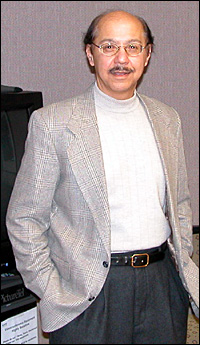|
The Rustbelt, Again?
part 1 2 3 4
We have a more understated sandwich with Rich Nemeth on the suburban outskirts of Pittsburgh. Nemeth turns 40 this year. His family has ridden the waves of the fast-changing economy for several decades, starting with his grandfather.
"He spent the majority of his working life at US Steel," says Nemeth. "He was getting close to retirement, but because of the way the industry was going, he had to take an early retirement."
Rich's father worked as a retail manager, then a Volkswagen worker until that factory closed, then a heating and air conditioning technician. Rich Nemeth, himself, started in retail. But in the '90s, like a lot of people, Rich thought he saw the future and got himself retrained in computers. He landed an information technology job with the big ketchup maker.
"I worked for H.J. Heinz company for almost five years," says Nemeth. "I was in their IT department doing data warehouse developing. You know, I wanted a permanent home, and I thought at Heinz I was going to be there thirty-plus years, be able to retire and go on."
But last year, Heinz decided to outsource its IT department to a contractor. Nemeth still worked at Heinz, but as an employee of the outside company.
"A few weeks later, they brought us all into a room and they said, 'Over half of your jobs are going to be outsourced to overseas, India, within the next so many months.'"
Nemeth's job was one of those headed for India. The outsourcing company said he could still have a job, but probably not in Pittsburgh. The company then switched gears and delayed its off-shoring plan, but Nemeth learned first-hand that the old days of lifelong job security are gone.
"The months that led up to the outsourcing and dealing with this and the wondering if and all that, it was just unbearable," says Nemeth. "Physically, mentally, at home. I actually went to the doctor and said 'I need something or else I'm going to lose it here,' you know?"
Nemeth survived his crisis. He looked for a new IT job and eventually found one. He still thinks computers are a good career choice. Pittsburgh has added a few thousand information jobs in the past decade.
 | Sunil Wadhwani, the founder and CEO of iGate Corporation |
When it comes to the outsourcing of IT work, several Pittsburgh companies have decided that if you can't stop the inevitable, you might as well get a piece of it. We went to see Sunil Wadhwani, the founder and CEO of iGate Corporation. His company has workers overseas who do computer projects for U.S. based companies.
"We are an outsourcing firm," says Wadhwani. "We have about 5,000 employees worldwide. Of that number roughly half are based in India."
Wadhwani is a slight, balding man with an easy smile. He founded iGate in the late 1980s, before people had any idea how big outsourcing was going to become. The company took off in the '90s. Now, Wadhwani sits at one of those big oval conference tables with microphones and a video-conferencing screen on the wall. Besides its Indian workers, iGate now employs 1,500 people across the United States, including 300 well-paid workers at the Pittsburgh headquarters.
"Over the last ten years," says Wadhwani, "we've paid over $1 billion in wages to U.S.-based workers. We've paid over $100 million in taxes in the U.S. The company and our employees, we've donated over a million dollars to charity. So if you look at which country, even though we operate in so many countries, which country has gotten the most benefit of what we do, definitely it's the U.S.."
Beyond that, Wadhwani argues outsourcing has broader long-term benefits that Americans should welcome.
"Countries that have been impoverished for decades now are getting good jobs, white collar jobs, the standard of living is going up, the level of education is going up, the level of illiteracy is coming down. These are all good things. It makes the whole world more stable, more peaceful, and so on."
Wadhwani is one of thousands of engineers and computer scientists who came from India to the United States to make good in business. He studied at Carnegie Mellon in the 1970s, and never left. Now, Pittsburgh's leaders are worried they're not attracting enough people like him. At one time, people in Pittsburgh might have feared that immigrants would take their jobs. Now, the city is reaching out, trying to pull in the foreign talent that tends to concentrate on the coasts.
Continue to part 4
| 


